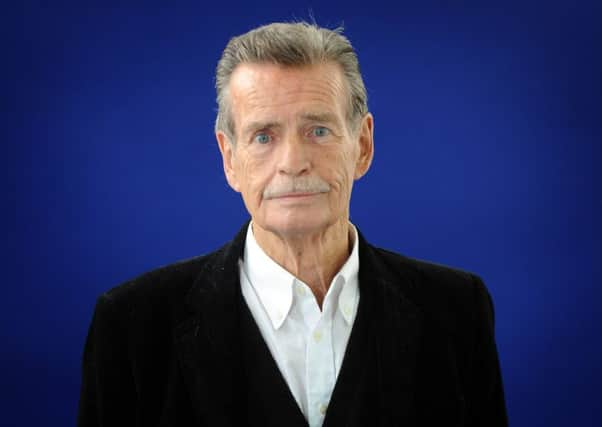Scots author William McIlvanney dies, aged 79


The novelist, whose evocative and gritty style earned him the soubriquet the godfather of Tartan Noir, died peacefully after a short illness at his home in Glasgow.
Last night Nicola Sturgeon led the tributes to the novelist whose brilliance was credited with bringing a new dimension to the crime fiction genre.
Advertisement
Hide AdAdvertisement
Hide AdLiterary figures joined the First Minister as they spoke of their admiration for his acclaimed body of work that included Laidlaw, Docherty, The Big Man and The Kiln.
• READ MORE: Martyn McLaughlin: The godfather of tartan noir
Sturgeon said Docherty was “one of the classic novels of our time” while the Rebus creator Ian Rankin and the Trainspotting author Irvine Welsh described his inspirational qualities as a writer and a person.
Although perhaps not the most prolific novelist (he produced eight novels and a short story collection in around 30 years), the quality of his output was remarkable.
His gifts were not confined to his novels. He was an accomplished poet and was well-known as a broadcaster. He was also a superb journalist, contributing a weekly column to this newspaper for many years.
Born in 1936 in Kilmarnock, he was the youngest of four children. His brother Hugh McIlvanney grew up to become a household name in journalism as arguably the country’s finest sports writer.
The son of a miner, McIlvanney drew on his Ayrshire working class heritage throughout his life.
His formative years were spent at Kilmarnock Academy before his education continued at Glasgow University, where he studied English and graduated with a MA in 1960.
Advertisement
Hide AdAdvertisement
Hide AdAfter university, he became an English teacher and wrote in his spare time. He rose to become assistant headmaster of Greenwood Academy in Irvine. By then he had published his first novel Remedy is None, a work that dwelt on the impact of the death of his father when he was still a teenager. His rich promise was recognised when his first book won the Geoffrey Faber Memorial Prize in 1967.
• READ MORE: William McIlvanney impressed by independence hope
He took the decision to become a freelance writer in the mid-1970s. On his last day in teaching, he learnt that Docherty had won the Whitbread Prize for Literature.
Regarded as the authentic voice of the Scottish working class, McIlvanney once told how he was approached by an ex-miner, who told him: “You’ve written my story, son.”
His 1977 novel Laidlaw, which had a Glaswegian detective inspector as its main protagonist, was hugely influential and helped to establish Scotland as a natural home of the crime novel. It was followed by The Papers Of Tony Veitch and Strange Loyalties, two similarly themed novels which were to make up the Laidlaw trilogy.
His work was brought to a wider audience when a film was made of The Big Man starring Liam Neeson and Billy Connolly.
Although not an overtly political writer, McIlvanney had been a long-standing advocate of home rule and during last year’s referendum said he supported a Yes vote. Last night Sturgeon said McIlvanney was a “huge influence” on her and had been a “local hero”, because he taught at the school she later attended.
Ian Rankin described him as “an inspired and inspiring author”. He was, Irvine Welsh added, “one of the loveliest guys you could hope to meet”.
Advertisement
Hide AdAdvertisement
Hide AdMcIlvanney is survived by his partner Siobhan and two children from an earlier marriage.
TRIBUTE BY WILLIAM PAUL
Willie McIlvanney was a big-name columnist for Scotland on Sunday in the 1990s but he was never a big ego. Already a giant of Scottish literature with impeccable intellectual credentials, he was a star in a time when celebrity was hard-earned and grudgingly acknowledged.
Willie didn’t tolerate fools, gladly or otherwise. He knew the value of his name and negotiated his fee accordingly. Then he made sure the newspaper got its money’s worth.
Which is where I entered the scene as assistant editor, handling the columns that made up the op-ed (opposite editorial) section, with Willie’s always in the prime space at the top of the broadsheet page. A column put down its roots early in the week with an idea that would be developed, played with, refined. Then it would be delivered late on Friday night and laid out on the page, which might mean adding, or losing, a chunk of 100 or 200 words.
Willie was never the quickest writer, but that was the job so he did it, or if small cuts and edits were necessary he would trust me to do it. Other columnists, who shall remain nameless, often threw their toys out of the pram if anyone dared to touch their precious words.
I like to think we built up trust at a series of editorial meetings, otherwise known as boozy lunches, where we discussed ideas and lamented the state of the world. Afternoons in Glasgow would stretch into late evenings in the pub, and more than once I was left running for the last train home from Queen Street. The column would follow in due course.
This was journalism in the raw, the genesis of some of Willie’s best columns that appeared at a time when circulation was in six figures and digital media was in its infancy.
It was not easy for him to put words on a page because he agonised over every allusion, every nuance of what he wanted to say. The paper got its money’s worth out of him and, when he felt he no longer had something valuable to contribute, he quit. Cheers Willie. It was good knowing you.
• William Paul is a former assistant editor of Scotland on Sunday